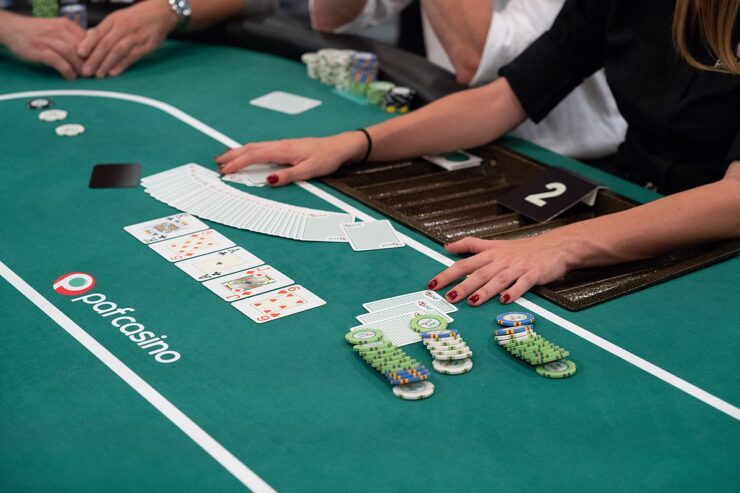Casinos have long been using intricate strategies to predict and influence human behavior. The significance of understanding these tactics extends beyond mere curiosity; it’s vital for both players who wish to play wisely and industry professionals aiming to maintain their edge.
This post will explore the fascinating world of casino strategies you’ll find at MMC996, unveiling the hidden methods used to sway player decisions and behavior. We’ll dissect how casinos blend psychology, technology, and environment to create a captivating world that often seems larger than life.
History of Behavioral Prediction in Casinos

The art of behavioral prediction in casinos has evolved significantly from its rudimentary beginnings. Initially, casinos relied on simple observations of player habits and preferences. Over time, these methods have advanced dramatically, integrating technology and psychology.
Early tactics involved studying player reactions and choices, gradually developing into a more nuanced understanding of human behavior. This evolution reflects a broader trend in the gaming industry, where understanding the customer has become as important as the games offered. This historical perspective sets the stage for a deeper exploration of the sophisticated strategies currently in play.
The Role of Psychology in Gambling
Casinos such as online casino Malaysia expertly employ psychological principles to influence player behavior. They tap into the basic human instincts of reward, risk, and decision-making. Every element in a casino, from game design to the overall ambiance, is carefully crafted to trigger emotional and psychological responses.
For instance, the thrill of a win or the near-miss effect keeps players engaged, often pushing them to play longer than intended. Understanding these psychological underpinnings is crucial for casinos to tailor experiences that resonate with players, ensuring both enjoyment and continued play.
Data Analytics in Player Tracking

In today’s digital age, casinos have embraced data analytics for player tracking with unprecedented depth. By collecting and analyzing data on player behaviors, casinos can tailor experiences to individual preferences, predict future behaviors, and even identify potential spending patterns.
This process involves monitoring game choices, betting patterns, and even time spent at various games. The insights gained allow casinos to customize rewards, offers, and promotions to keep players engaged and returning. The sophisticated use of data analytics marks a significant shift in how casinos understand and interact with their patrons.
Slot Machines: Design and Tactics
Slot machines, a staple in casinos, are masterfully designed to appeal to human psychology. Their bright lights, captivating sounds, and even the physical layout are meticulously planned to attract and retain players.
The tactics used extend beyond visual and auditory appeal; they include game mechanics that give a sense of control, frequent small rewards, and the allure of a big jackpot. These elements work together to create an engaging experience, encouraging players to stay longer and continue playing, often leading them down a path of increased spending and prolonged engagement with the game.
Table Games and Dealer Training

The design of table games and the training of dealers are critically important in influencing player behavior. Table games are not just about the rules and odds; they are about the experience. Dealers play a key role in this, trained to create an inviting atmosphere, recognize player habits, and respond accordingly.
They’re skilled in keeping the game engaging, often encouraging players to continue playing. The interaction between players and dealers is a subtle yet powerful tool in influencing decisions and enhancing the overall experience at the table.
The Use of Environmental Cues
Casinos expertly use environmental cues like lighting, sound, and layout to create an atmosphere that subtly influences player behavior. The strategic placement of games, controlled lighting that blurs the sense of time, and sounds that signal winning moments all work together to create an environment that encourages longer play.
This manipulation of the senses not only enhances the gaming experience but also plays a significant role in keeping players engaged. The psychology behind these environmental factors is complex, tapping into our deepest sensory responses to create a compelling, almost hypnotic environment that can lead to increased gambling time and expenditure.
VIP Programs and Loyalty Rewards

VIP and loyalty programs in casinos are not just perks but strategic tools used to predict and influence the behavior of high rollers. These programs are carefully designed to offer rewards and incentives that create a sense of exclusivity and prestige, encouraging repeated visits and higher stakes gambling.
The psychological impact of being recognized as a VIP or receiving tailored rewards taps into the basic human need for recognition and belonging, making these players more likely to remain loyal to a particular casino. Casinos analyze spending patterns and preferences to fine-tune these programs, ensuring that they effectively maintain the engagement of their most valuable players.
Impact of Alcohol and Complimentary Services
The provision of complementary services, such as free alcoholic beverages, is a calculated strategy employed by casinos to affect player decision-making. Alcohol is known to lower inhibitions and can lead to riskier gambling behavior, while free services create a sense of indebtedness and goodwill towards the establishment.
This combination can lead to increased gambling time and spending. The strategic offering of these services is not random; casinos carefully balance the cost against the potential for increased revenue, ensuring that the house always has an advantage. Understanding the psychological impact of these ‘free’ services helps players remain aware of the tactics used to influence their behavior.
Technology and Future Trends
Emerging technologies like facial recognition and AI are revolutionizing the way casinos predict player behavior. These technologies can identify individual players, track their habits, and tailor experiences to keep them engaged longer. For example, facial recognition can alert staff to the presence of high rollers, ensuring they receive personalized service.
AI analyzes vast amounts of data to predict player preferences and develop strategies to maximize engagement. Looking ahead, these technologies are likely to become more pervasive, offering casinos unprecedented insights into player behavior and further refining their ability to predict and influence it.
Ethical Considerations and Responsible Gambling
The use of psychology and data to influence gambling behavior raises significant ethical concerns. There is a fine line between enhancing the gaming experience and exploiting vulnerabilities. The industry faces the challenge of balancing profitability with the responsibility of promoting responsible gambling.
Measures such as self-exclusion programs, setting betting limits, and providing resources for problem gambling are essential. Casinos must ensure that their strategies do not lead to harmful gambling behaviors, maintaining a commitment to the wellbeing of their patrons while providing an entertaining and engaging experience.
Conclusion: The Future of Gambling and Behavior Prediction
In conclusion, the ability of casinos to predict and influence human behavior is a multifaceted strategy involving psychology, technology, and environment. As technologies advance and our understanding of human behavior deepens, these strategies will become more sophisticated.
The future of gambling lies in a delicate balance between leveraging these insights for business success and ensuring ethical practices and responsible gambling. For players and industry insiders alike, an awareness of these tactics is crucial, offering insights into the intriguing interplay between human behavior and the art of gambling.

